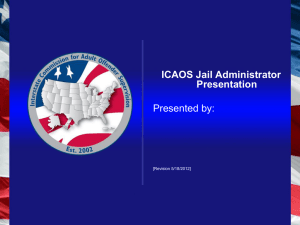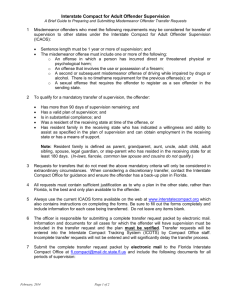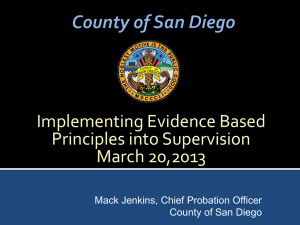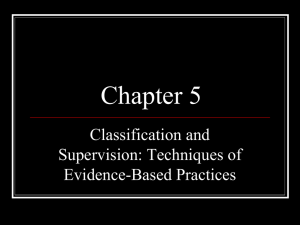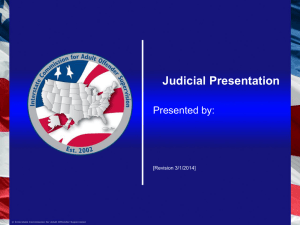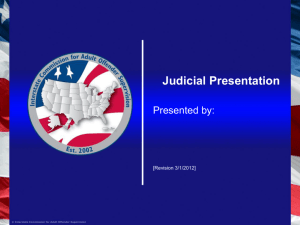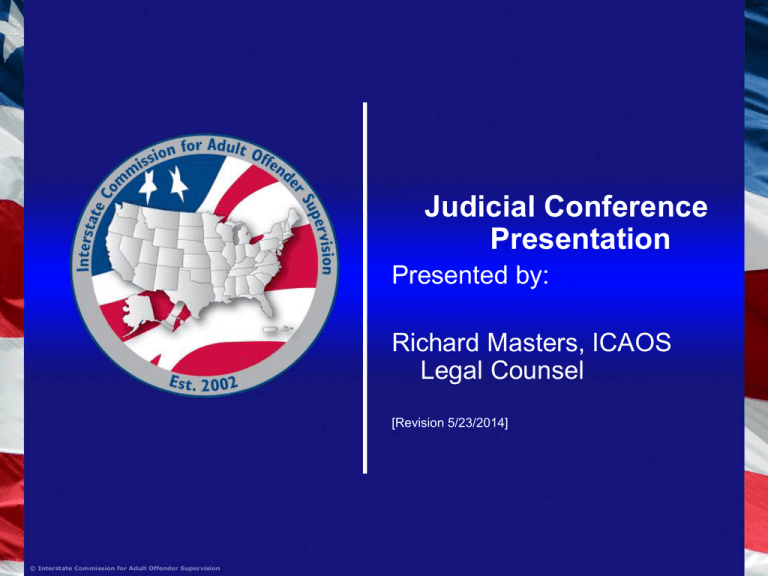
Judicial Conference
Presentation
Presented by:
Richard Masters, ICAOS
Legal Counsel
[Revision 5/23/2014]
Presentation Objectives
Interstate Compacts
Elements, uses and authority
Overview of Interstate Compact for Adult
Offender Supervision
Judicial Considerations of the ICAOS
Interstate Compact Elements
• Contracts creating administrative agencies
• Enforceable means to address common
issues
– State laws may still differ
– Authority is not relinquished to the federal
government
Interstate Compacts Address
•
•
•
•
•
•
•
•
•
Boundary dispute resolutions
Natural resource management
State transportation
Taxation
Environmental matters
Regulation
Education
Corrections
Public safety
Implications of
Congressional Consent
– Transformative effect: equivalent of federal law under the “law of
the union doctrine.”Delaware River Comm’n v. Colburn, 310 U.S.
419, 439 (1940); Cuyler v. Adams, 449 U.S. 433 (1981); Texas
v. New Mexico, 482 U.S. 124 (1987).
– Relevant for jurisdictional and interpretative purposes, but also
gives compact the weight of substantive federal law.
– Compacts enforceable under the Supremacy Clause and the
Contract Clause.
– But they remain subject to control of party states, who may
amend or repeal them.
5
Congressional
Consent & ICAOS
•
Congressional consent requirement applies to ICAOS,
as it did to its predecessor (ICPP), because the compact
arguably affects powers delegated to Congress:
–
–
–
•
Authority to regulate interstate commerce
Authority to regulate extradition
See, e.g. Cuyler v. Adams, 449 U.S. 433, 442 (1981) (Interstate
Agreement of Detainers is an interstate compact within the
meaning of Art. I, § 10 because it implicates Congress’s power
to legislate in the area of interstate commerce and extradition).
Consent given under Crime Control Act of 1934
(authorized and encouraged states to form compacts for
cooperative efforts in crime prevention)
6
Authority of the Interstate Compact
• Article I, Section 10, Clause 3 of the U.S.
Constitution – the “Compact Clause
• The Crime Control Act of 1934
– Cuyler
vs.
Adams,
449
U.S.
433
(1981).
Compact rules supersede any state laws
in conflict with them.
Purpose of ICAOS
• Promote Public Safety
• Protect the Rights of Victims
• Effective Supervision/Rehabilitation
• Control Movement of Offenders
• Provide for Effective Tracking
Interstate Compact Legislation
• Courts, Parole Boards, Community
Corrections & other Executive Agencies
– subject to ICAOS rules
– MUST enforce & effectuate the Compact
K.S.A. § 22-4110
National Governing Body
• All 50 states, the District of Columbia, Puerto
Rico, and the U.S. Virgin Islands are members
of the Interstate Compact
– Rule Making Authority
– Compliance Enforcement
• Audits
• Sanctions for non-compliance
Considerations for
Sentencing
• ICAOS impacts how offenders are:
– Transferred to another state
– Supervised over state lines
– Returned to a sending state when in violation.
What Triggers the Compact?
An eligible offender subject to supervision requests
to relocate to another state.
“Relocate” means to remain in another state for more than 45
consecutive days in any 12 month period.
Rule 2.110
Authority to Regulate
• There is no “right” of convicted persons to
travel across state lines. See, Bagley v.
Harvey, 718 F.2d 921 (9th Cir. 1988).
• Convicted person has no right to control
where they live; the right is extinguished
for the balance of their sentence. Williams
v. Wisconsin, 336 F.3d 576 (7th Cir. 2003),
Transfer of Offenders
• Sole discretion of Sending State
• No right to relocate
• Receiving state has up to 45 days to
investigate plan of supervision
– Acceptance (valid for 120 days)
– Denial
Rules 3.101, 3.104, 3.104-1
No Travel Prior to Transfer Reply
• The offender SHALL NOT proceed to
the receiving state.
– Advisory Opinion 9-2006 & 3-2004: If an offender is in a
receiving state prior to acceptance, the Receiving State can
properly reject the request for transfer.
Rule 3.102
Eligible for Reporting
Instructions during Investigation
Granted within 2 days of request (sex offenders-5 days)
– Probation offenders living in the receiving state
at the time of sentencing. (Rule 3.103)
– Emergency situations. (Rule 3.106)
– Military Member, Residing with Family of
Military, Veterans Receiving Treatment,
Residing with Family Member who’s
Employment Transfers, Offender Employment
Transfer (Rule 3.101-1)
– Employment during investigation (Rule 3.102)
Supervision
• Receiving state determines degree of
supervision
– MUST be consistent with the supervision of
other similar offenders sentenced in the
receiving state
• Special Conditions
• Violations
• Sending State determines length of
supervision.
Rule 4.101 & 4.102
Special Interest
• Movement of Sex Offenders
– No travel w/o approved reporting instructions
• Out of State for Work or Treatment
– >45 days & eligible
Victims
• Victim Notification and Right to be Heard
– Change in Offender Status
– Right to Comment
Special Interest for
Judicial Authorities
• Imposing Special Conditions
Sending State required to give same effect
to a violation of a special condition imposed
by the receiving state
Retaking & Violations
• Retaking Interstate Compact Offenders
– Waiving Extradition Rights
– Violations
• Sending State must respond within 10 business days
– If offender absconds, warrant must be issued upon receipt.
• Probable Cause Requirements
“Warrant”
• Issued by either the sending or receiving
state
• SHALL be entered in the NCIC Wanted
Person File with a national pick-up radius
No Bail or Other Release Conditions
Kansas Found in Default 2013
• Kansas Offender Transferred to Washington
• Offender was convicted of a violent crime
• County officials chose not to issue warrant, refused to
extradite back to Kansas, and declared the case
“unsuccessful discharge”, releasing offender from
supervision
• Kansas found to be in violation of the Compact
– Resulted in a fine of $100,000
– Fine suspended in lieu of an approved correction action plan
consisting of training and a review in processes
KS Case Studies
• Giving approval to reside in another state
without Compact approval
• Discharging when should be retaking
• Not transferring “mail in reporting”
offenders or those supervised outside of
probation (bench supervision)
Kansas State Council
• Made up of 4 legislators, and
appointments from Governor’s Office,
Attorney General, Secretary of
Corrections, Prison Review Board, Victim
Services, Chief Justice, 1 County Attorney
and 1 private attorney.
• Meets at least once a year
• Provides oversight on Kansas compact
policies and practices
Judicial Immunity
• Judicial immunity provides “judicial
officers” with immunity for their JUDICIAL
actions.
• NOTE: Not even judges have absolute
judicial immunity for non-judicial,
administrative actions.
42 U.S.C. 1983
Negligent Supervision
1. Negligent release of an offender on parole
after which the offender commits a foreseeable
crime.
Johnson vs. State, 553 N.W. 2d 40 (Minnesota, 1996)
Pate vs. Alabama Board of Pardons and Paroles, 409
F. Supp 478 (1976)
Martinez vs. California, 444 U.S. 277 (1980)
27
Negligent Supervision, cont.
2. Liability arising from the negligent supervision
of offenders on parole or probation.
Reynolds vs. State, 471 N.E. 2d 776 (Ohio,1984)
Doe vs. Arguelles, 716 P.2d 279 (Utah, 1985)
Hansen vs. Scott, 645 N.W. 2d 223 (ND, 2002)
Tuthill case in Maryland
Small vs. McKennan Hosp. 403 N.W. 2d 410 (SD 1987)
28
Status of Public Employees
• In the public employment context, the issue of
immunity and liability are controlled by the types
of acts undertaken.
• Most public employees think they are immune
from suit by the ancient principle of sovereign
immunity. They are not.
• Depending upon the state, sovereign immunity
may have only limited application and offer only
limited protection.
29
Types of Public Acts
Generally two categories:
Discretionary: freedom to exercise good
judgment
Ministerial: impose a mandatory duty
Liability
• Generally, public employees are immune from suit for
discretionary acts. The failure to exercise discretion as a
plaintiff might desire IS NOT grounds for liability. For
example, the decision to parole someone is usually a
discretionary act. However, the conduct must not violate
the principle of “reasonableness” and clearly established
statutory or constitutional rights.
• Generally, public employees are not immune from suit
for failing to fulfill a ministerial act and may be personally
liable. For example, a probation plan that mandates a
minimum of five meetings a month imposes a ministerial
duty.
31
www.interstatecompact.org
Interstate Compact Resource
Courts
Jail
Administrators
Parole Boards
Community
Corrections
Interstate
Compact
Office
Other
Executive
Agencies
Key Personnel
• Kansas Commissioner
– Kathleen Graves
• Commission Chair
– Mr. Milton Gilliam, Oklahoma
• Executive Director
– Harry Hageman
• General Counsel
– Mr. Richard L. Masters, Esq.
• Kansas Deputy Compact Administrator
– Matthew Billinger
Point of Contact
• Matthew Billinger
– Kansas Deputy Compact Administrator
• (785) 296-8069
• matthewb@doc.ks.gov
• Chris Mechler, CSO Specialist
– Kansas Interstate Compact Council, ViceChair
– Office of Judicial Administration
• (785) 291-3223
• mechlerc@kscourts.org
Questions


